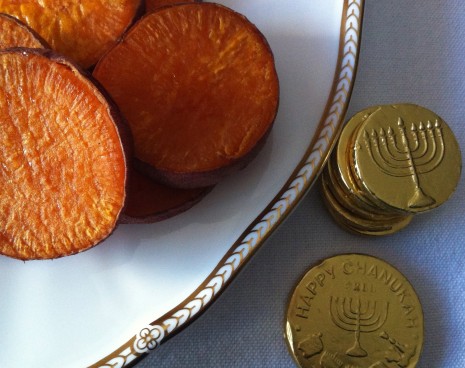ROASTED SWEET POTATO COINS FOR—WHAT ELSE?—THANKSGIVUKKAH
The rare alignment of Thanksgiving and the first day of Hanukkah has brought the invention of a new portmanteau word, way too many puns (“Gobble-Tov!”), people at the supermarket meat counter wondering aloud if sausage stuffing would be bad form, and the angst that occurs when you saddle a blissfully gift-free occasion with presents.
I suppose all the fuss was to be expected. Because the dates of the two holidays always vary (Thanksgiving is linked to the fourth Thursday in November and the eight days of Hanukkah are reckoned by the Hebrew calendar), the world won’t see this convergence roll around again for something like 80,000 years. (Click here for a explanation from physicist and Jewish calendar math whiz Jonathan Mizrahi.) Perhaps by then we will have settled on a single spelling for the word Hanukkah. Or not.
Both holidays are about gratitude, and if this hybrid occurred more often, it could be a real moneymaker. Look at the cottage industry that’s sprung up around the more common overlap of Christmas and Hanukkah. It’s inspired numerous worthy interfaith handbooks as well as a 2003 episode of The O.C. television show, an O.C. c.d., Chrismukkah cards, a Chrismukkah cookbook, a childrens’ book (Blintzes for Blitzen), and even a Hanukkah tree topper. Talk about a merry mish-mash!
But back to Thanksgivukkah. What I find interesting is the widespread presumption that on Thanksgiving Day all Americans eat exactly the same food, the sort conjured by Norman Rockwell’s sentimental 1943 painting Freedom from Want (aka “the Thanksgiving Picture”). In my experience, however, plenty of families happily veer far from the Rockwellian ideal based on their heritage and the local bounty of the season, and they don’t give it a second thought.
For lots of folks in the Lowcountry of South Carolina and Georgia, for instance, turkey is what’s enjoyed if you’re not too full after an epic oyster roast. And over the years, I’ve spent the holiday with friends whose must-have “traditional” sides include Moroccan-spiced carrots and parsnips, braised Kashmiri greens, jeweled rice, Korean pancakes, or a deconstructed stuffing along the lines of an Italian bread salad, rich with chestnuts, pancetta, and broccoli rabe. So I suspect that sweet potato latkes, matzo ball soup made with turkey broth, challah or rye-bread stuffing, and cranberry rugelach or strudel aren’t as novel as some would lead you to believe.
Sam and I are saving the latkes for a soon-to-be-designated brisket night, but I found myself thinking that there still needs to be some sort of bridge between the classic Thanksgiving spread we’ll be enjoying and the lighting of Sam’s menorah, a bit later in the day. My inspiration came from the corner Duane Reade, in the form of chocolate Hanukkah gelt wrapped in gold foil. Slicing sweet potatoes crosswise into “coins” is nothing new, but the simple technique works especially well on a day that can be otherwise fraught in the kitchen. The prep is nothing to speak of, and the slices roast very quickly; by the time the turkey has finished resting and the gravy is made, they’ll be done.
The custom of giving away gelt (Yiddish for “money”) to children, by the way, dates back to the Middle Ages, but its roots stretch back much further. During the early years of the Hasmonean dynasty (142–63 B.C.E.), the first Jewish coins were issued; most of them depicted cornucopia, symbolic of the prosperity during these years. And according to Hanukkahgelt.com, it’s traditional to share your good fortune with those in need or for a good cause. This year, I belatedly discovered that during November, Disney-ABC Television Group will fully match gifts (up to $250,000, for you big spenders) to Feeding America. There’s not much time left, so hurry! The goal is to provide 40 million pounds of produce to those in need. The Boulder, Colorado–based nonprofit Conscious Alliance aids local food pantries nationwide—in particular, those on economically isolated Native American reservations. And if you’re hankering for an official Thanksgivukkah apron or T-shirt, visit ModernTribe.com; all items are now (understandably) final sale, but ten percent of the proceeds will benefit the nonprofit Jewish hunger program Mazon.
Roasted Sweet Potato Coins
This recipe is extremely adaptable. You can substitute coconut oil for the olive oil, for example, or brush the coins with pure maple syrup about halfway through roasting. To peel or not beforehand is up to you; I like leaving the skin on to get every last bit of flavor and nutrition out of the vegetable, but if the skin is on the gnarly or tough side, get rid of it.
Sweet potatoes
Extra-virgin olive oil
Coarse salt and freshly ground pepper
Preheat the oven to 325º. Cut the sweet potatoes crosswise into slices about ¼ inch thick. Toss the sweet potatoes with extra-virgin olive oil to coat, season with salt and pepper, and place in a single layer on 1 or 2 rimmed baking sheets. Roast, turning the slices over once or twice (and switching placement of the baking sheets if using 2) until they are tender and deep golden, 20 to 30 minutes.
Posted: November 26th, 2013 under autumn, recipes, Thanksgiving.


